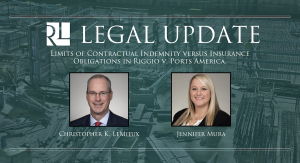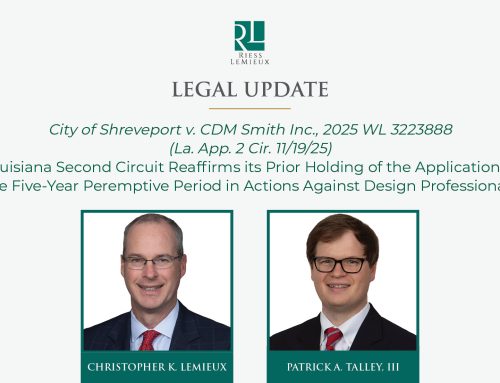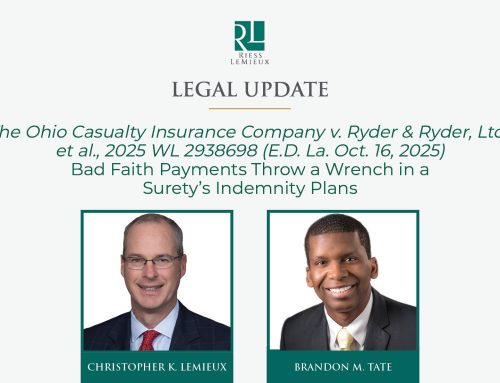 The Fourth Circuit Explores the Limits of Contractual Indemnity versus Insurance Obligations in Riggio v. Ports America.
The Fourth Circuit Explores the Limits of Contractual Indemnity versus Insurance Obligations in Riggio v. Ports America.
Thomas Riggio v. Ports America Louisiana, L.L.C. et al., — So.3d —-, 2024-0436 (La. App. 4 Cir. 12/5/24).
Authors: Christopher K. LeMieux and Jena Mura
In Riggio v. Ports America Louisiana, LLC, the Louisiana Fourth Circuit Court of Appeal examined issues of indemnification and insurance coverage under the contractual provisions of the Tariff for Facilities in the Port of New Orleans (the “Tariff”). The Tariff governs the use of the Port of Orleans’ facilities and imposes certain rules and obligations for its “users.”
This case arose following a collision at the Port of New Orleans involving a tractor-trailer operated by Thomas Riggio and a yard truck driven by an employee of Ports America Louisiana, LLC (“Ports”). Thomas Riggio filed a personal injury lawsuit alleging negligence by Ports’ employee. In response, Ports sought indemnification and insurance coverage under the Tariff from third-party defendants, STG Logistics (“STG”), Safeco Insurance (“Safeco”), and ACE American Insurance (“ACE”). The trial court granted two summary judgment motions, one filed jointly by STG and Safeco, and another by ACE, dismissing Ports’ claims and Ports appealed.
Indemnification Analysis
The Court first determined that the Tariff did not violate the Louisiana Anti-Indemnification Act (“LAIA”), which prohibits indemnity agreements in certain contracts from shielding an indemnitee from its own negligence. The Court then turned to the general principles of indemnity and reaffirmed that indemnity agreements are governed by their specific terms, rather than by allegations made in related lawsuits.
The trial court had ruled against Ports, interpreting the Tariff to require Ports to assume responsibility for its own negligence unless it could produce evidence of fault on the part of STG or its employees. The trial court relied on the allegations in Riggio’s petition which stated that the collision was caused by Ports’ own employee and found that because no evidence was produced demonstrating the fault of STG, Ports has not met its burden.
The Fourth Circuit found three errors in this ruling. First, the allegations in the petition are irrelevant in determining indemnity obligations and only the language of the agreement is controlling. Second, the Tariff did not require proof of fault by STG (the indemnitor) to trigger indemnity obligations. Third, the trial court’s decision was premature as no judicial determination of Ports’ fault had yet been made. Based on these errors, the Court reversed summary judgment in favor of STG and Safeco and remanded the case.
Insurance Coverage Analysis
The Court also addressed whether ACE owed insurance coverage to Ports as an additional insured under the policies issued to STG’s predecessor, XPO Logistics. The policies’ stated two conditions for additional insured coverage: (1) a written contract executed before the loss naming Ports as an additional insured, and (2) coverage only applied to “bodily injury” or “property damage” caused by the acts or omissions of the named insured, its employees, or agents.
Applying the “eight corners rule”—which requires courts to consider not only the language of the policy but also the allegations in the plaintiff’s petition—the Court found that Ports failed to meet the second condition. The petition attributed the collision solely to the negligence of Ports’ employee, with no allegations linking the incident to acts or omissions of XPO or its agents. Consequently, the court affirmed the trial court’s summary judgment in favor of ACE, concluding that Ports did not qualify as an additional insured and ACE owed no duty to defend or indemnify.
Key Takeaways
By reversing the summary judgment on the indemnity claims while affirming the denial of insurance coverage, the Court’s ruling reinforces the distinction between contractual indemnification and insurance obligations. Courts must assess contractual indemnity claims based solely on the agreement’s language, independently of allegations in the underlying petition, while insurance coverage determinations require the analysis of the petition’s allegations in addition to the policy’s language. This decision further highlights the importance of meeting all conditions specified in an insurance policy, especially when seeking additional insured status.



